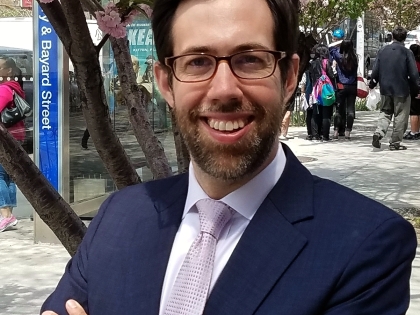
DNAinfo: Chinatown's Stinky Street Puddles a Drain on Community, Pols Say
By Patrick Hedlund
CHINATOWN — Chinatown’s pervasive street puddles pose health and quality-of-life problems in the bustling neighborhood and need to be addressed more effectively by the city, a group of local officials said Friday.
State Sen. Daniel Squadron called on the Department of Transportation to fix the fetid pools, which don’t regularly drain, giving Chinatown a reputation for uncleanliness and driving away business, he said.
Squadron released a report Friday on the “ponding” problem — water pooling in the streets, near the curb — citing a whopping 93 separate puddles he found during the first two weeks of August throughout the neighborhood that didn’t drain a full two days after rainfall.
The report singled out five block — along Mulberry, Mott, Elizabeth, Bayard and Baxter streets — as having a particularly high concentration of ponding.
The senator, joined by Councilwoman Margaret Chin and other Chinatown officials, said persistent ponding discourages people from coming to the neighborhood and poses a risk to pedestrians trying to navigate the odorous pools, which often collect refuse and other dirty street liquids. The standing water also seeps into the roadbed, creating larger potholes, he added.
“It sinks,” Squadron said, at a press conference in Columbus Park Friday. “It’s a real drain on the quality of life of the community.”
The senator asked that the city create a specific 311 category for ponding, to develop a more effective system for recording and tracking repair requests.
“No one knows what to do about it,” Squadron said, referring to his report, which found that more than half of respondents surveyed about the issue did not know who to contact or that reporting the problem was even possible.
The DOT said it does respond to complaints about ponding and will fix any road defects whenever possible. If the pool requires significant draining or the addition of a catch basin, the agency refers the matter to the Department of Environmental Protection, a DOT spokesman said.
A spokesman from the city's Department of Information Technology and Telecommunications added that 311 does currently take complaints about ponding — approximately 2,000 to 3,000 per year citywide — and usually routes them to DEP for inspection. If the agency finds a road defect, it will refer the issue to DOT for repair.
Nearly three-quarters of survey respondents in the report said the nasty puddles negatively impacted their shopping or eating experiences.
“It really is a health issue as well,” said Chris Kui, executive director of Asian Americans for Equality, noting that the pools attract street runoff as well as including mosquitoes and other insects. “We want to make sure that these holes get filled.”
The report was released just days after the City Council unanimously approved the formation of a Chinatown Business Improvement District, which would be responsible for street cleaning and other beautification efforts in the community.
“We’re trying to build Chinatown to make it brighter and cleaner,” said Chin, a big proponent of the BID. “We got to find a solution to this problem.”
Community Board 3 district manager Susan Stetzer, who was also on hand at the press conference, said fixing the puddles has been one of the board’s budget priorities for years.
“People can’t get where they’re going,” she said of the effect on residents and tourists, who local merchants rely heavily on for business.
Squadron was quick to note that it’s ultimately the city’s responsibility to repair poor road conditions.
“The idea of, ‘Oh, that’s just Chinatown’ is unacceptable,” he said.